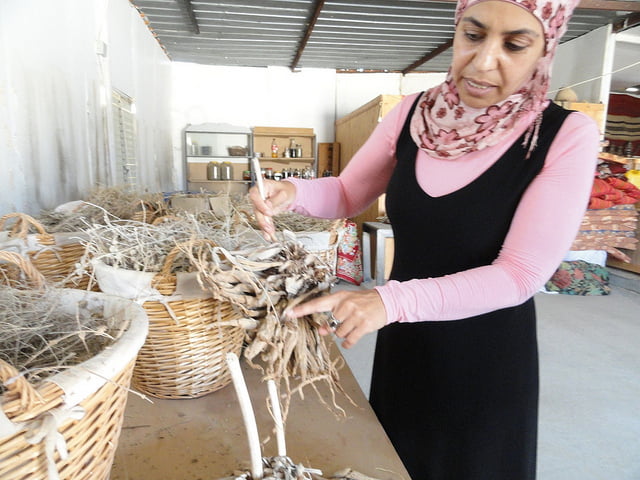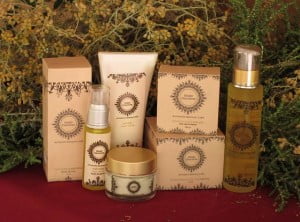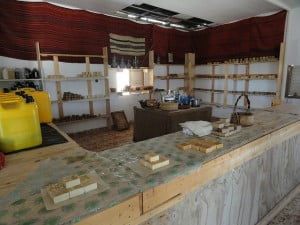Like many other Bedouin women from her generation, Mariam Aborkeek, now in her early 40s, was born in a tent and was raised under the heavy hems of her mother’s and grandmother’s Bedouin dresses. However, unlike most Bedouin women, she was lucky enough to learn the trade secrets of being a medicine woman from her grandmother –– ancient natural Bedouin wisdom, which Aborkeek has turned into an international beauty business from Israel, called Desert Daughter.
Related articles
- How Chewing 10 Tons Of Sunflower Seeds Brings Arabs And Israelis Together
- High-Tech Center In Southern Israel To Employ Orthodox, Ethiopians, Arabs
The company is based out of a series of old animal sheds that Aborkeek’s father gave her when he realized his daughter’s hobby had become a life passion. There, in the outskirts of Tel Sheva in Israel’s Negev desert, a small crew of women makes and sells soaps, creams, lotions and potions derived from plants of the nearby desert.
Large baskets of drying herbs, twigs and strange fruits in various stages of the production process are scattered around the rooms. In the space that was once animal sheds, there’s now a lab, a storage house for raw materials, a kitchen, a storefront and a lecture room and a welcome space for people who come to learn more about Bedouin healing and the products that Aborkeek creates, based on the ancient wisdom of her grandmother.
It all started with some camel milk
Aborkeek took her time finding her way in the natural cosmetics business. When she went to London to study marketing 15 years ago, she admired all the fancy name-brand cosmetic products. But after some time she found her skin was getting dry and flaky. On a trip home she went back to using her grandmother’s homemade products, such as soap made from camel’s milk – and the skin problems cleared up.
Around that time, her friends in London started requesting these natural products too and told her they were superior to the store-bought brands. With her compass pointed back home, Aborkeek returned to Israel and decided she would learn the trade from her grandmother. That was in the late 1990s.
“When we lived together in the tent, I remember watching her cutting herbs,” says Aborkeek. “I realized she had so much knowledge, using no preservatives, only herbs and oils.”
The official company Desert Daughter was established in 2005. Later that year, her grandmother died.
Modern ways of applying ancient secrets
Today, Aborkeek’s contributions to her own product line are important. While some of her grandmother’s treatments came from the same raw materials, applications were sometimes sticky and uncomfortable. Aborkeek says she has worked to find ways to distill the healing ingredients from the plants and herbs and put them into products that are comfortable and practical for the “rub in and go” Western way of life.
Sign up for our free weekly newsletter
SubscribeAborkeek employs local Bedouin women in her center. Working with Desert Daughter has given these women new opportunities. Tourists come through to sample and buy the products, and the staff helps prepare breakfast or brunch, providing a traditional Bedouin experience based on hospitality.
Some of Aborkeek’s trademark products include camel’s milk soap, black cumin oil soap, and a joint relief oil that can also treat arthritis and back pain, according to Aborkeek. The joint treatment is based on a strange desert fruit: the colocynth, otherwise known as bitter apple, bitter cucumber, desert gourd, egusi or the biblical vine of Sodom.
Another favorite local ingredient sourced by Aborkeek is the white wormwood herb. The perennial shrub grows wild on the steppes of the Mediterranean. It is known as an excellent antiseptic and anti-spasmodic remedy.
Promoting sustainable business in Israel
According to the manufacturer, the Desert Daughter products come with both healing and beautifying aspects –– and that’s how Aborkeek sold the idea of going commercial to her grandmother, who at first opposed the idea of making money from the wisdom of the ancients.
Most Desert Daughter products are sold through direct marketing rather than in stores. But Aborkeek does have a fan base of international buyers and is looking for ways to connect better with overseas markets interested in promoting fair trade and sustainable products from Israel.
She says that the act of going out to the desert to pick the herbs and spices each spring is actually good for the plants, some of which are at risk. She learned from her grandmother how to pick so that the plants can regenerate and grow better in the coming year.
And even though she’s dressed traditionally in Bedouin garb, with a headscarf and full dress, Aborkeek’s fancy Italian clogs give away her passion for fashion and appreciation for modern culture as well.
Photo Tadmit MFA
Related posts

Rehabilitation Nation: Israeli Innovation On Road To Healing

Israeli High-Tech Sector 'Still Good' Despite Year Of War







Facebook comments